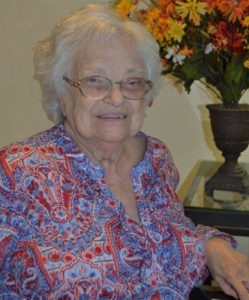Penina Bowman’s current and past interests are vast—bowling, gardening, playing piano, sewing, public speaking, ceramics, cards, reading, cooking, and much more.
“I’m never bored,” Bowman said.
She says she likes to keep active because it helps her cope with her past. Bowman is a woman of many talents, and she is also a Holocaust survivor.
In April 1944, at just 17 years old, Bowman and her parents and siblings were forced from their home in Cluj, Romania into concentration camps. Bowman, her mother and two sisters were sent to Auschwitz, and her father and brother were sent to Dachau. Bowman credits her sisters for her survival.
“Because we were together, it helped a lot,“ she said.
After six months in Auschwitz, Bowman and her sisters were selected to work at an electronics factory guarded by Nazi soldiers, but conditions there weren’t much better. After six months at the factory, the war ended and Holocaust survivors were liberated. Sadly, her parents did not survive but remarkably, Bowman and all three of her siblings did.
Bowman’s Holocaust experiences are incredibly moving, but she also has a beautiful and movie-worthy story about meeting her late husband, Harold. After liberation, she met Harold in Salzburg, Austria, where she was staying with a group of other young Holocaust survivors waiting to go to Palestine. Harold was a U.S. Soldier from Chicago with an interest in Hebrew so he visited the group in hopes that someone could practice with him to help him improve. Although Bowman didn’t know Hebrew, Harold pursued her anyway.
“When he came to our group, we were dancing,” she said. Harold asked Bowman to dance but it took time before she finally agreed.
“He just had an eye for me,” Bowman said. “On the third time, I finally said yes.”
Harold began teaching her Hebrew. They started dating, but Bowman’s friend had to accompany them on their first few dates.
“Because I couldn’t understand him, she translated for me. After three months, I was able to speak to him.”
Several months of courtship passed before Harold was discharged from the Army and had to go back to Chicago, but not before he gave Bowman a gift—a package that contained parachute fabric. She saved the fabric and later used it to make her wedding dress, which is now displayed at the William Breman Jewish Heritage & Holocaust Museum in Atlanta.
Through much adversity, Bowman eventually made it to Palestine where she and Harold reconnected because he used his military GI Bill benefits to study there so that he could be with her. He already told his family about her, and they sent along a trunk filled with clothing and other items for her.
“They adopted me like their daughter,” she said. Harold and his family also helped her learn English.
The couple eventually married, moved to Chicago and had three children. In the late 1950s, they took a trip to Israel where she was surprised to see that people weren’t talking about the Holocaust.
“I was so shocked,” said Bowman. “They were not even teaching about it in schools. It really disturbed me that they didn’t put any emphasis on it so when I came back to America, I told my brother-in-law, who was teaching Hebrew, about my experience and he told me that if I wanted to speak, he could find plenty of places for me to speak.”
Bowman started speaking at synagogues, schools and various clubs. She even took public speaking and writing classes so that she’d be more comfortable when she gave presentations.
Bowman recounts her Holocaust experiences vividly, and several years ago, she participated in a film project to record the personal accounts of survivors. The project was the brainchild of Steven Spielberg, who founded the University of South Carolina’s Shoah Foundation Institute for Visual History and Education, the organization that conducted the testimonials. Bowman’s full testimonial can be found here.
Bowman was a short-term patient at A.G. Rhodes of Cobb. She lives in Marietta, Ga. and has three children, three grandchildren and two great-grandchildren.


